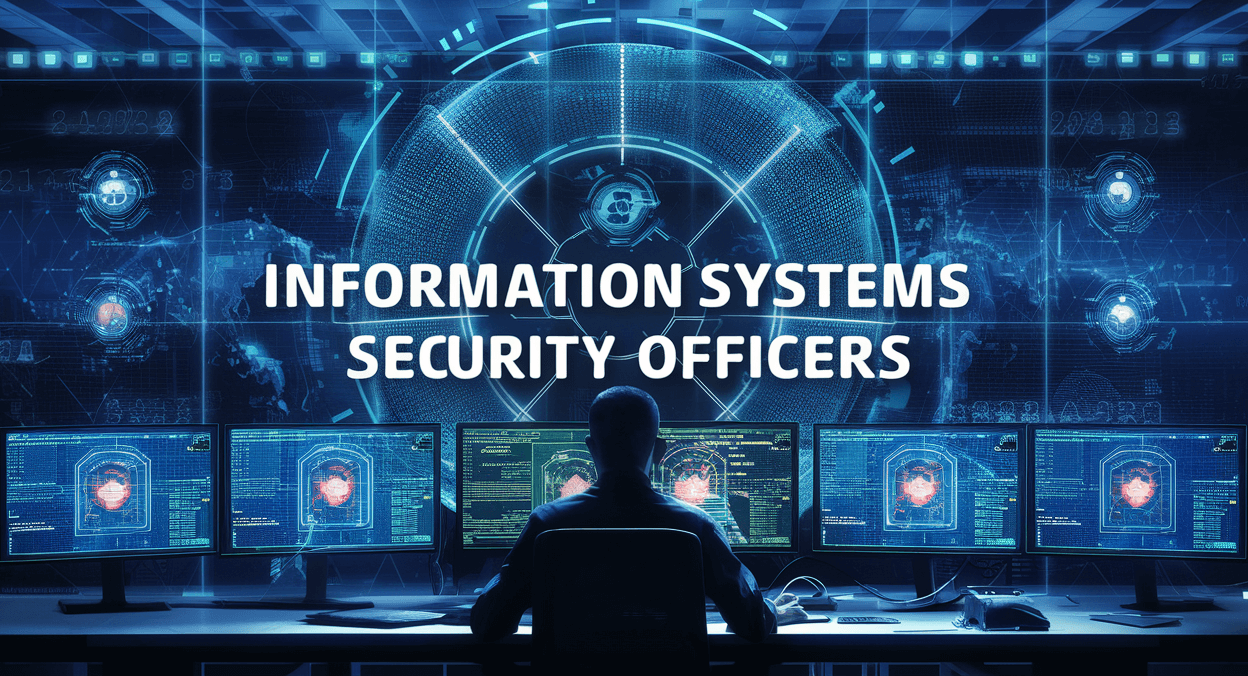In today’s hyper-connected world, data is new gold. From personal details to confidential business information, all reside within the digital domain. It underscores the imperative to safeguard this data more than ever before. This brings to light the indispensable contribution of Information Systems Security Officers (ISSOs). They serve as staunch protectors of our digital infrastructures, diligently endeavoring to shield our information from unauthorized access. But what exactly do they do? Let us explore crucial functions performed by an ISSO.
Envision a thriving metropolis that relies on police officers for law enforcement, firefighters for emergency response, and traffic controllers for smooth operations. In a parallel manner, ISSOs fulfill a multifaceted role in the digital sphere. They ensure the security and integrity of information systems. Such professionals represent frontline defense against cyber threats. They strive to avert breaches, detect intrusions, and manage incidents.

Jump ahead to
A Day in Life of ISSO: Beyond Basic Security Measures
The duties of Information Systems Security Officers are varied and contingent upon specific organizational context. However, several foundational responsibilities are universally applicable. These include:
Risk Assessment and Management
This is the cornerstone of any security strategy. ISSO identifies potential vulnerabilities within systems and processes. They evaluate the probability and potential impacts of threats and devise mitigation strategies. Think of it as identifying weak spots in castle walls and reinforcing them before an attack. This process encompasses:
- Conducting regular vulnerability assessments and penetration tests.
- Analyzing security logs to identify irregular activities.
- Developing and implementing comprehensive risk management frameworks.
Security Policy Development and Implementation
ISSO is tasked with formulation and enforcement of security policies that dictate stewardship of information within an organization. These policies function as authoritative guidelines for employees, delineating acceptable usage of systems, data management protocols, and incident response procedures. This includes:
- Formulating policies related to password management, data access, and incident reporting.
- Ensuring adherence to pertinent industry regulations and legal requirements (GDPR, HIPAA).
- Conducting security awareness training for personnel.
Incident Response
In the event of a security incident, such as a data privacy or malware attack, Information Security Management System is the initial responder. They assess incidents, contain any damage, and initiate recovery processes. This entails:
- Developing and testing incident response protocols.
- Conducting forensic analyses to ascertain root causes of incidents.
- Engaging with stakeholders and coordinating recovery efforts.
Security Auditing and Monitoring
ISSO routinely audits systems and processes. It guarantee compliance with security policies while identifying potential vulnerabilities. They also monitor security frameworks for suspicious activities and investigate anomalies. This includes:
- Executing regular security audits of systems and networks.
- Monitoring security logs and intrusion detection systems.
- Implementing Security Information and Event Management (SIEM) solutions.
Remaining Vigilant in a Dynamic Landscape
The landscape of cybersecurity threats is in constant flux, with new vulnerabilities and attack methodologies continually surfacing. Thus, Information Systems Security Officers must remain informed. It includes the latest security trends and technologies to safeguard their organizations effectively. This entails:
- Participating in industry conferences and workshops.
- Reviewing security literature and research studies.
- Attaining relevant certifications (e.g., CISSP, CISM).
What is the significance of the Information Systems Security Officer Role?
The significance of Information Systems Security Officer (ISSO) extends far beyond simply keeping data locked away. Their role is crucial for health, stability, and an organization’s future in today’s digital landscape. Here’s a deeper look at why their work is so vital:
- Reputation: A data breach isn’t just a technical problem; it’s a public relations disaster. News of compromised data spreads quickly, damaging an organization’s hard-earned reputation. This erosion of trust can lead to loss of customers, brand damage, and legal scrutiny.
- Financial Stability: The financial impact of a data breach can be devastating. Beyond immediate costs of investigating and containing breach, organizations face regulatory fines, legal and litigation costs, recovery and remediation costs, and loss of business and revenue.
- Operational Continuity: Security incidents can bring business operations to a grinding halt. This disruption can lead to downtime, lost productivity, and supply chain disruptions.
- Personal Privacy: ISSOs are on the front lines of protecting individuals’ fundamental right to privacy. Their work helps prevent identity theft, financial fraud, and emotional distress.
Essential Skills of Information Systems Security Officers
To excel as an ISSO necessitates a distinct combination of technical prowess, analytical acumen, and communication skills. These critical skills include:
Technical Proficiency:
A robust comprehension of networking, operating systems, security technologies, and programming languages is indispensable. This includes:
- Networking: A deep understanding of network protocols (TCP/IP, DNS, HTTP), network architectures (LAN, WAN, VPN), and network security devices. This knowledge allows ISSOs to identify network vulnerabilities and implement effective security measures.
- Operating Systems: Familiarity with various operating systems (Windows, Linux, macOS) and their security features. This includes understanding user permissions, file system security, and system hardening techniques.
- Programming/Scripting: Basic programming or scripting skills (e.g., Python, PowerShell). It can be highly beneficial for automating tasks, analyzing logs, and developing custom security tools.
- Cloud Security: With the rise of cloud computing, understanding cloud security concepts, cloud platforms (AWS, Azure, GCP), and cloud security tools is becoming increasingly important.
Analytical Skills
The capacity to interpret complex data, discern patterns, and evaluate risks is vital for proficient security oversight. This involves:
- Data Analysis: The ability to use risk analysis methods, identify suspicious activity, and correlate events to detect potential threats.
- Risk Assessment: The ability to identify, assess, and prioritize security risks based on their likelihood and potential impact. This includes using risk assessment frameworks and methodologies.
- Threat Intelligence: The ability to gather and analyze information about current and emerging threats to proactively defend against attacks.
- Forensic Analysis: In some cases, ISSOs may need to conduct forensic analysis to investigate security incidents and determine root cause.
- Problem-Solving Skills: ISSOs must swiftly and effectively address security incidents and resolve intricate technical challenges.
Incident Response
The ability to follow established incident response procedures to contain, eradicate, and recover from security incidents.
- Troubleshooting: The ability to diagnose and resolve technical problems related to security systems and infrastructure.
- Critical Thinking: The ability to analyze situations objectively, identify potential solutions, and make informed decisions under pressure.
- Communication Skills: Clear and concise communication is paramount. It aids in collaborating with technical teams and engaging with stakeholders. Furthermore, it helps in conducting security awareness training.
Technical Communication
This includes explaining complex technical concepts to both technical and non-technical audiences.
- Written Communication: The ability to write clear and concise reports, policies, and procedures.
- Verbal Communication: The ability to effectively communicate with stakeholders. It includes management, employees, and external vendors.
- Training and Education: Developing and delivering security awareness training to employees to promote a security-conscious culture.
Conclusion
Information Systems Security Officers serve as often-overlooked champions of the digital realm. They are custodians of our data, laboriously engaged in protecting us from ever-evolving spectrum of cyber threats. Their contributions are fundamental to preserving security. Moreover, protecting integrity, and privacy of information in today’s interconnected environment. Thus, when one hears of a company successfully countering a cyberattack, it is essential to acknowledge ISSOs working diligently behind the scenes. They protect our digital existence, functioning as gatekeepers of our digital sanctuaries. People enroll in Information Systems Security Management Certification Training offered by Unichrone and can become security heroes by saving companies from saving their information.
FAQs
What do Information Systems Security Officers do?
ISSOs are the guardians of digital information, protecting systems from cyber threats, detecting intrusions, managing incidents, and ensuring data security and integrity. They’re like the police, firefighters, and traffic controllers of the digital world.
Why are Information Systems Security Officers so important for organizations?
ISSOs protect reputation, financial stability, operational continuity, and personal privacy. A data breach can be devastating, so their work is essential for an organization’s well-being.
What are the key skills needed to be a successful ISSO?
Candidates will need a mix of technical skills (networking, operating systems, security technologies), analytical abilities (risk assessment, data analysis), and strong communication skills to become a successful ISSO.
Do ISSOs only deal with technical issues?
No. While technical proficiency is crucial, ISSOs also develop policies, train employees, and communicate with stakeholders. It requires strong communication and interpersonal skills.
What is involved in risk assessment and management for an ISSO?
It’s about identifying vulnerabilities, evaluating threats, and creating mitigation strategies. It includes fortifying a castle before an attack. This includes vulnerability assessments, penetration tests, and security log analysis.
How do ISSOs handle security incidents like data breaches?
They act as first responders, assessing the damage, containing the incident, initiating recovery, and conducting forensic analysis to understand the root cause.
Why is ongoing learning so important for ISSOs?
The cybersecurity landscape is constantly changing. So, ISSOs must stay updated on the latest threats and technologies through training, conferences, and certifications.
How does an ISSO contribute to protecting personal privacy?
By preventing data breaches and cyberattacks, ISSOs directly protect individuals from identity theft, financial fraud, and other harms associated with compromised personal information.



